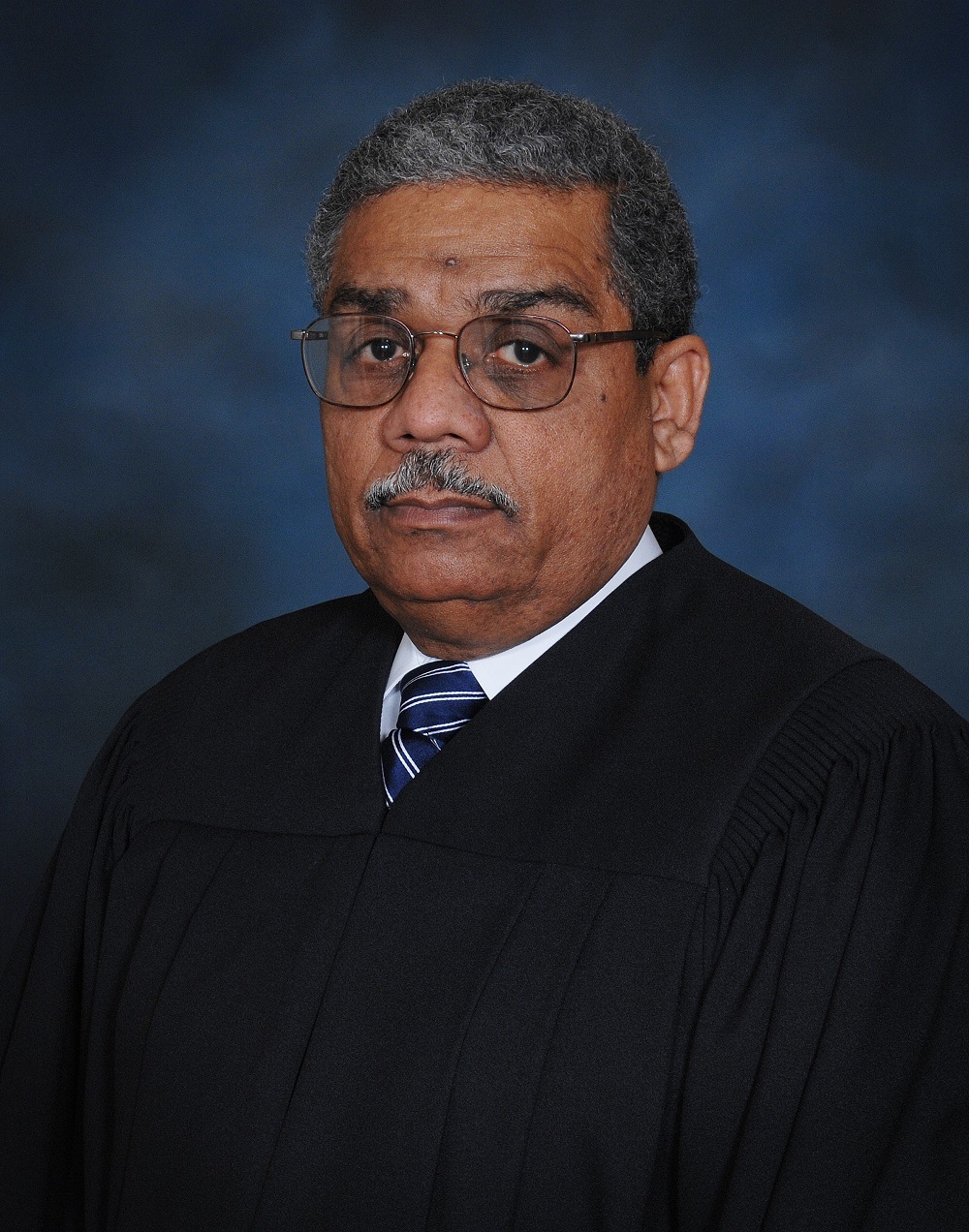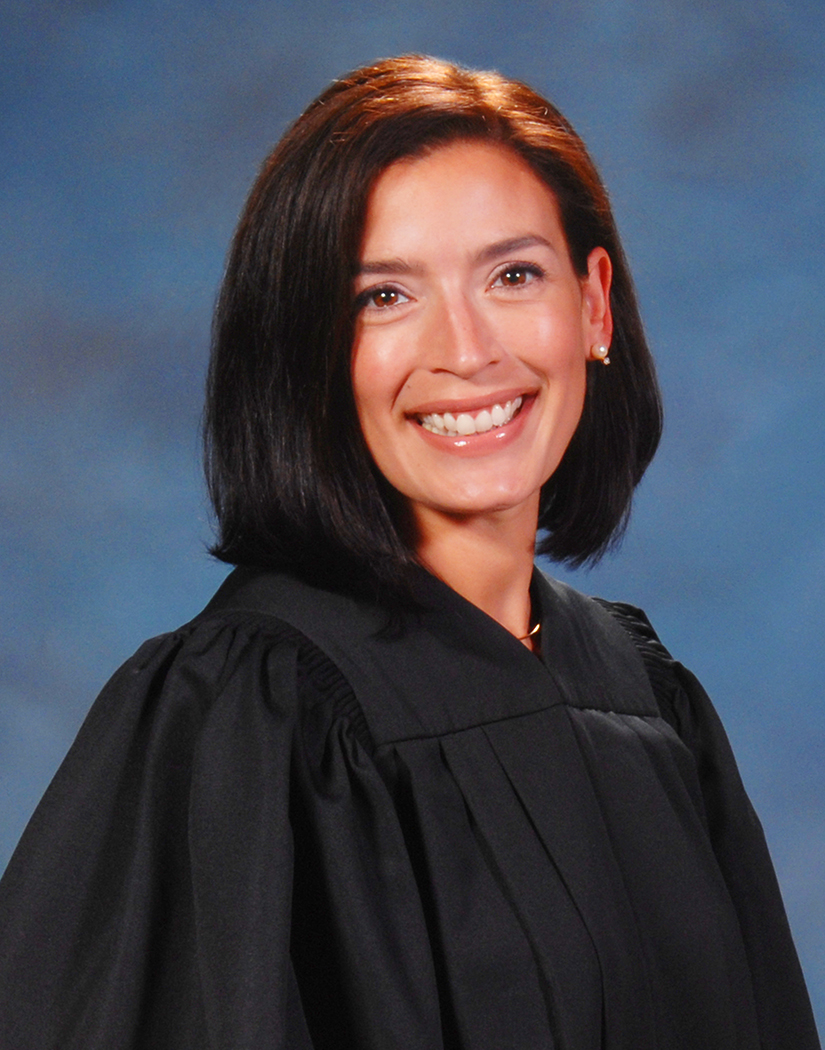
Mailer sent to city residents on behalf of the seven sitting Circuit Court judges up for election in Baltimore in the upcoming June 24 primary advises voters to “Skip #2,” obliterating the name of challenger Page Croyder, who is listed alphabetically on the ballot in the No. 2 position.
PAGE CROYDER RUNNING
TO ATTEMPT TO UNSEAT
CIRCUIT COURT CHIEF
Opposed reappointment
of Judge Alfred Nance
by Governor O’Malley
SKIP #2 — NOT A JUDGE
By Alan Z. Forman
Page Croyder wants to unseat the Chief Judge of Baltimore City’s Circuit Court for what she describes as “sexual miscon- duct” and “inappropriate judicial behavior.”
Gov. Martin O’Malley was “wrong” to reappoint him, Croyder says, and “should have advertised” the position instead of blindly permitting Judge Alfred Nance to run for a second term as a sitting judge.
The governor is focusing on his “next step” — running for president — she told Voice of Baltimore in a free-wheeling interview earlier this week focusing on her upstart candidacy to unseat one of the city’s seven Circuit Court judges up for election June 24th.
“Every time he gets a step, he begins to run for the next one,” she said of O’Malley. As such, he is not paying attention to the judiciary, she charged.
O’Malley reappointed Nance for a second 15-year term, to which he must be elected this November, beginning with the party primaries Tuesday after next. Nance was originally appointed to the court in 1997 by then-Gov. Parris N. Glendening and was elevated to Chief Judge in February of this year.
In an attempt to make the judiciary “nonpolitical,” Maryland, like many other states, requires sitting Circuit Court judges to run for election after their appointment — which they typically do on both major party ballots as a “slate,” that in Croyder’s estimation deludes voters into thinking they have to vote for all the judges listed, to the detriment of independent candidates like herself.
The sitting judges created “this slate business,” she says, to enable themselves to run as a “tested and trusted” group — their words, she points out — implying that all challengers to their incumbency are therefore not similarly “tested and trusted.”
But the question is, she adds: “‘Tested and trusted’ by whom?” [See box below.]
Croyder maintains voters “should never vote for an entire slate,” that they should vote only for a specific judge or judges that they have “a particular reason” to want to keep on the bench, much as voters do when electing a state delegate, where three seats are open in each district but a single vote may be cast if desired.

Former Assistant State’s Attorney Page Croyder is running an uphill battle to unseat Chief Baltimore City Circuit Court Judge Alfred Nance, who she accuses of “inappropriate judicial behavior.”
(VoB Photo/Alan Z. Forman)
In this regard, “All the sitting judges are deceiving the public about Judge Nance” by enveloping him with their so-called “tested and trusted” mantra and including him in their group, she says.
Over the years, Nance has been the subject of repeated complaints for what many have termed injudicious conduct on the bench, including “inappropriate” remarks and bullying behavior toward witnesses, lawyers, women, and prospective jurors.
Croyder says his “inappropriate behavior was known inside the courthouse 15 years ago, prior to his first election as a judge.” In announcing her candidacy she charged that because of “a conspiracy of silence from the courthouse and from the bar, the information never reached the public and he was elected [and] continued with his subtle sexual harassment of women….”
However others have described Nance as a well-qualified, conscientious jurist who has issued “a lot of courageous decisions.” As one courthouse insider noted: “It’s like being a cop: You can’t come into contact with thousands of litigants and lawyers and issue unwanted decisions for years without drawing complaints.”
Croyder often draws complaints also. A city employee who declined to be identified told VoB she frequently read the blog that Croyder’s been writing for six years and found it to be “informative” and insightful.
“But then I began to realize she simply had an ax to grind.”
In 2001 Nance was publicly reprimanded by an independent judicial disciplinary panel that found he had acted in “undignified… inappropriate… and demeaning” ways in his courtroom and private chambers toward women, and has three times been the subject of judicial disciplinary investigations.
On one occasion he ordered a woman to be locked up for 10 days for yelling to a defendant in his courtroom, “Love you!” as the defendant, who was the woman’s brother, was being led away by guards at the conclusion of his trial.
A public defender interceded for the woman and convinced Nance to rescind the order to incarcerate her.
He also typically makes prospective jurors describe their marital status, Croyder maintains, and on at least one occasion suggested that a “suitable mate” might be found for a juror who described herself as “single.”
From the Baltimore City Sitting Judges’ mailer to local voters:
The Baltimore City Sitting Judges Committee supports the election of each of the seven judges who must stand for election in 2014: Melissa K. Copeland, Jeffrey M. Geller, Philip S. Jackson, Alfred Nance, Christopher L. Panos, Melissa M. Phinn, Julie R. Rubin. The retention of sitting judges in challenged elections is vital to the stability of the bench and to attract well-qualified men and women to seek appointment to the circuit courts throughout Maryland. Each of the sitting judges was vetted by a gubernatorial nominating commission at the time of his or her initial appointment to the bench by the Governor.
The Maryland Constitution requires Circuit Court Judges to stand for election after appointment. The Governor of Maryland undertakes a comprehensive vetting process to appoint a new judge when a vacancy occurs on the Circuit Court. Pursuant to a Gubernatorial Executive Order, the Maryland Judicial Nominating Commission vets and nominates lawyers to fill vacancies on the Circuit Court. Lawyers who are nominated by the commission meet exceptional standards of legal aptitude and must be the “most distinguished for integrity, wisdom and sound legal knowledge” as dictated by the Maryland Constitution.
The Maryland Constitution requires that Circuit Court Judges, once appointed, must run in the election after their appointment to be retained.
The Baltimore City Sitting Judges have distinguished backgrounds and are committed to equal justice and the fair administration of the law. Learn more about our 7 Sitting Judges [by clicking] here.
Read more at: www.baltimorecitysittingjudges.com/judicialprocess.php
It is rare for a judge to be publicly rebuked, but the Maryland Commission on Judicial Disabilities found in 2001 that Nance — who agreed to accept the reprimand rather than face a court hearing on the charges — had also been “rude… and hostile” not just toward women but also to male lawyers in a medical malpractice case.
Unfortunately for Croyder, however, she can’t run specifically against Judge Nance because there are six associate judges also on this year’s ballot, all running for election to a new 15-year term on the court, all of whom have been vetted and endorsed by the Bar Association of Baltimore City and the bulk of the local legal community.
Croyder — who has not been similarly vetted — is a retired assistant states attorney who worked for over 20 years as a prosecutor, 13 of them under former City State’s Attorney Patricia C. Jessamy until 2008, at which time she transitioned to personal blogging in order to “bring an insider’s perspective to Baltimore’s criminal justice system” — in her words, “to illuminate for lay people some of the reasons why ‘the system’ so often fails to function effectively.”
Prior to coming to Baltimore she served for four years as a commissioned officer and law specialist for the U.S. Coast Guard in New York City and now manages a senior citizens’ apartment complex in the Inner Harbor, while living in Hampden with her 16-year-old son.
Questioned as to why she has never sought political appointment to the bench in advance of election — the traditional way most judges are made — “I had to make a choice,” Croyder said: “Be silent or tell the truth.
“I chose to tell the truth. I’m running to give an alternative to a bad judge.”
She believes Jessamy’s downfall as City State’s Attorney was “not entirely” the former SA’s fault. (Jessamy was defeated in 2010 by Gregg Bernstein, whose charge that she wasn’t doing enough to get criminals off the street resonated with African-American voters, the overwhelming majority of Baltimore City’s electorate and the base of Jessamy’s support.)
“She got diverted-off by her ‘war’ with O’Malley” and should have tried harder not to become political, Croyder says.
“A lot of credit” for whatever success the city has had in fighting crime is due to Rod J. Rosenstein, she believes, the United States Attorney for the U.S. District Court of Maryland.
However she says Jessamy’s successor, Bernstein, focused too much attention on obtaining “luxurious new office space” for his department and has failed “to make the case” for why he should be reelected.
Bernstein “promised to be transparent,” she notes, “but what will ultimately cost him the election is if he hasn’t made a case for himself” by Election Day.
“Jessamy didn’t focus,” she explained. “People were fed up with Jessamy”; the same could happen with Bernstein, she says, who faces two challengers in the June 24 Democratic primary, one of them the wife of a City Council member.
Regarding bail reform, Croyder believes the recent revision to the Public Defender Act which would provide for legal representation during the bail-hearing portion of a suspect’s initial appearance before a District Court Commissioner is “the wrong solution to a real problem,” even though she believes the current bail system “discriminates against the poor.”

Judge Alfred Nance was publicly reprimanded 13 years ago by the Maryland Commission on Judicial Disabilities, which found he had been “rude… and hostile” to women and lawyers.
It’s been two years since the Maryland Court of Appeals mandated that criminal suspects be represented by counsel at every stage of their cases. But Croyder maintains that rather than speeding up the process, “paying for lawyers to be available” at every step will actually “slow up the system, at an enormous financial cost to taxpayers.”
Baltimore’s criminal justice system “needs to focus on the violent criminals, as Rod Rosenstein has done,” she explained, “with alternative methods to handle the people who are not violent,” such as those who “cycle through because of mental illness.”
Croyder was instrumental in creating the city’s so-called “War Room” in 2004 and was Chief of the Central Booking Division of the State’s Attorney’s Office when Martin O’Malley was Mayor and city police were locking up “everything that moves, and even what doesn’t move,” she said.
“[T]he idea was to focus on repeat violent offenders who were under criminal justice supervision,” she wrote on her blog in 2008.
“The State put up the money for personnel, the city chipped in with equipment and technology, and the War Room was placed in the hands of Jessamy, Baltimore’s top prosecutor. Attorneys and clerks were supposed to identify the violent offenders who were on probation, make bail recommendations when they were arrested, and track their progress through the criminal justice system. They did exactly that, recording the results of bail hearings, cases, and hearings on parole and probation violations.
“But the only information Jessamy decided to publish was the result of bail hearings. Although her staff was collecting a rich repository of data that could be used to identify the most dangerous criminals and to keep them off of the street, Jessamy refused to share the information that would make the mission successful.”
The War Room concept ultimately failed.
Croyder acknowledged she’s fighting an uphill battle to be elected to the Circuit Court. The last time a challenger unseated a sitting judge in Baltimore occurred more than 20 years ago when two incumbents were defeated. The last contested judicial election in the city — unsuccessful for the challenger — occurred in 2006.
Responding to VoB’s observation that the cards seem stacked against her, she said the system whereby sitting judges obtain support from the bar association and the city’s legal community — endorsements as well as campaign financial support — “bugs the crap outta me!”
The sitting judges “have hundreds of thousands of dollars” to run their campaign, she pointed out. “I have nothing.”
![“My beef with Judge Nance [is] how he treats people. It’s indefensible. He is always ready to explode, always throwing his weight around.”](http://voiceofbaltimore.org/wp-content/uploads/2014/06/CroyderPage-2.jpg)
“My beef with Judge Nance [is] how he treats people. It’s indefensible. He is always ready to explode, always throwing his weight around.”
However “my beef with Judge Nance” has little to do with his decision-making, she emphasized. “It’s how he treats people. It’s indefensible. He is always ready to explode, always throwing his weight around.
“If elected I will advocate for holding judges to a higher standard, and continue to educate the public about the system, about how things work, how the system can improve,” she added; how it currently “works for the convenience of lawyers and judges.
“Politicians, like O’Malley,” she said, “in appointing judges like Al Nance, make compromises for the good of their own careers, not for the good of the people”; then added: “When I see O’Malley lying about the small things” — such as why he reappointed Nance without advertising for the position — “I worry about the big things.”
She said she thinks it’s possible the Maryland governor —who she considers to be “a lightweight” — could be “our next president.
“He wants it very much,” she said. “He’s working very hard at it. It depends on how the chips fall.
“His first priority is his career. Even his [Celtic rock] band advances his career.
“But don’t tell people you’re a family man when you spend all that time playing in a band,” she complained.
As for her colleagues in the legal profession, “Attorneys are hard-pressed to complain” about Judge Nance, she told the Baltimore Sun in 2009, “because they fear retaliation and know that nothing is going to happen to these judges.”
And those on the bench are there “not by running, but by developing political contacts,” so it’s highly unlikely any of them are going to rock the boat.
Croyder says that “to be a good judge, one needs to have experience with people: There is no substitute for experience.” Moreover, she maintains, “I have as much if not more experience than all those judges.”
By not running within the system Croyder has alienated lawyers and judges alike, including some who have suggested she should drop out of the race.

Associate Judge Julie R. Rubin is listed on the July 24 primary election ballot alphabetically at the bottom of the list of City Circuit Court sitting judges.
When she previously ran for Circuit Court in 1998 she faced similar opposition to her candidacy — and was forced to take an unpaid leave of absence from her job as deputy state’s attorney. In that election she got approximately two-thirds as many votes as the lowest-polling sitting judge in the Democratic primary but only lost the Republican contest by 394 votes.
If she prevails in the Republican primary June 24th she will be on the ballot in November; however she’ll face a Baltimore City electorate that is overwhelmingly Democratic: The city has not elected a Republican council member since the 1930s, and only one Republican has been elected mayor in the last 70 years.
Croyder is not a Republican. However, judicial elections are non-partisan, so all candidates appear on both ballots.
Her candidacy likely hurts younger, more recent appointees to the court than Nance, such as Judge Melissa K. Copeland, who was elevated from the District Court of Maryland in February, and Associate Judge Julie R. Rubin, who was named to the 8th Judicial Circuit for Baltimore City last December and took her position in January of this year.
A partner in the law firm Astrachan Gunst Thomas Rubin, where her practice focused primarily on employment and business litigation, Judge Rubin had been a frequent commenter on WYPR’s “Midday” with Dan Rodricks prior to her appointment to the City Circuit Court.
However in order to remain as nonpolitical as possible, sitting judges typically decline media interviews and do not comment publicly, especially regarding their own elections. As such, VoB has been unable to obtain firsthand commentary for this article from the sitting judges.
[Full disclosure: Rubin’s former law firm, now Astrachan Gunst Thomas, P.C. (founded in 1994 and specializing in intellectual property law), is a longtime supporter of Voice of Baltimore. The firm’s advertising appears on this page.]
Asked specifically about the likely damage her candidacy may cause to Rubin’s chances for election — the judges are listed alphabetically on the ballot, with Rubin’s name appearing last — Croyder insisted: “It’s not my responsibility” to protect the “slate of sitting judges.
“If Rubin gets knocked off — and I don’t think she will — it’s their fault [the sitting judges, the bar association and the lawyers who support the full slate], not mine.”
“My responsibility is to tell the voters the truth about a judge who has misbehaved.”
alforman@voiceofbaltimore.org






December 13th, 2015 - 1:06 AM
I know Melissa phinn had granted sexual favours to men in places of authority and frequently makes bizarre rulings that can’t be explained. She recently let a former police officer away with slitting the throat of a dog he was attempting to gain control of at one point he remarked “I’m going to gut this thing” only hoping who ever she sold out to get her seat grows tired of her ratty looks and weak oral sex play and we get some new blood we really have the worst legal system Baltimore suck.